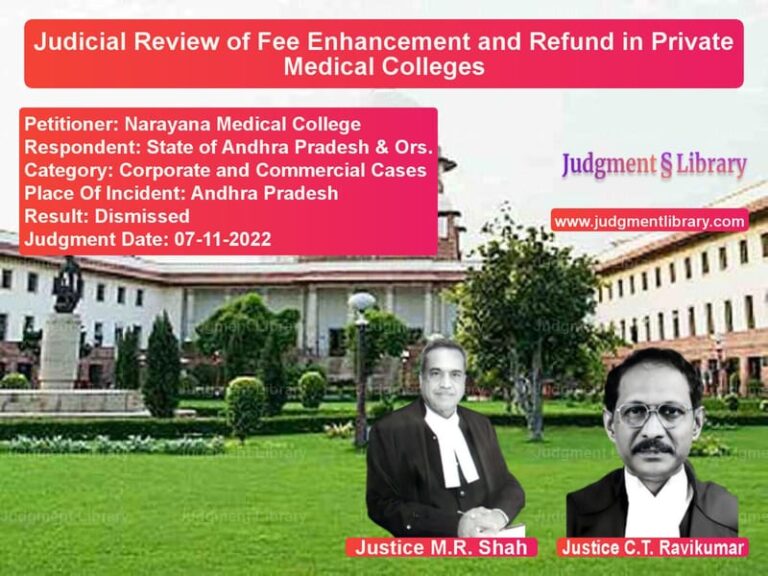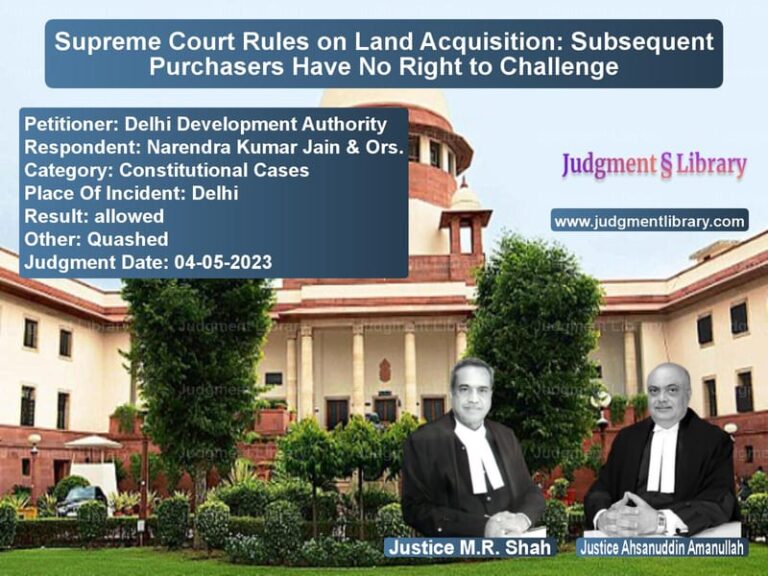Supreme Court Directs Security Measures and Digitization in Court Complexes
The Supreme Court of India recently delivered a crucial judgment in Pradyuman Bisht v. Union of India & Others, addressing the urgent need for enhanced security measures and digitization in court complexes across the country. The case was initiated as a public interest litigation (PIL) to improve security within judicial premises following incidents of violence and safety concerns for judges, lawyers, and litigants.
Background of the Case
The case originated as a writ petition filed by Pradyuman Bisht, who sought directions for the installation of CCTV cameras in court complexes and the recording of evidence during trial proceedings. Over time, the scope of the petition expanded to include broader security concerns and digitization efforts for courts.
The Supreme Court took cognizance of multiple security breaches in court premises, including:
- Incidents of gunfire within courts in Delhi.
- The suspicious death of an Additional Sessions Judge in Jharkhand, initially suspected as a hit-and-run but later investigated as a potential homicide.
- Frequent threats to witnesses and litigants within court premises.
Given these concerns, the Court examined reports from various High Courts, police departments, and the amicus curiae, Senior Advocate Siddharth Luthra, before issuing comprehensive directions.
Key Legal Issues
- Whether the installation of CCTV cameras in court complexes is necessary for transparency and security.
- Whether the lack of security measures compromises the integrity of the judicial process.
- Whether digitization, including audio-video recording of trials, should be implemented nationwide.
Petitioner’s (Pradyuman Bisht) Arguments
- The safety of judges, litigants, and lawyers is paramount, and the absence of security measures exposes them to serious risks.
- The installation of CCTV cameras would help in monitoring and preventing security breaches.
- Recording of evidence during trials would enhance transparency and protect against tampering or coercion.
- There have been multiple instances of violent attacks in court complexes, highlighting the urgent need for action.
Respondent’s (Union of India & High Courts) Arguments
- The government has been working on enhancing security and has taken steps to improve safety in court complexes.
- Some High Courts have already installed CCTV cameras and implemented security protocols.
- Financial and logistical challenges exist in implementing security measures in all courts, particularly in remote districts.
- Privacy concerns must be addressed when installing surveillance systems in judicial premises.
Supreme Court’s Judgment
The Supreme Court issued a series of binding directions to improve security and digitization in courts:
Security Measures
- High Courts must develop a comprehensive security plan in consultation with state governments and police departments.
- Each court complex must have a dedicated Court Security Unit with trained security personnel.
- CCTV cameras must be installed at strategic locations, including entry and exit points, but with safeguards for privacy.
- New court buildings must integrate security measures, including metal detectors, baggage scanners, and biometric access control.
- Emergency services such as ambulances, fire-fighting units, and medical assistance must be available in court premises.
- Encroachments and unauthorized businesses within court complexes must be removed to prevent security threats.
Digitization of Judicial Infrastructure
- All courts must implement audio-video recording of trial proceedings to maintain transparency.
- District courts must be equipped with video conferencing facilities for remote hearings.
- High Courts must take steps to live-stream important cases, ensuring public access to court proceedings.
- e-SEWA Kendras must be established in all court complexes to assist litigants with online case tracking and document filing.
- Courts must prioritize digital case management to reduce paperwork and improve efficiency.
Implementation and Compliance
The Supreme Court directed that:
- Each High Court must submit a monthly status report to the Chief Justice on security improvements and digitization efforts.
- State governments must allocate adequate funds for implementing security measures.
- The Registrar General of each High Court must oversee the execution of these directives.
- High Courts must ensure that security measures are extended to district and taluka courts.
Impact of the Judgment
- Enhanced Court Security: The ruling aims to prevent security breaches and ensure the safety of all court users.
- Greater Transparency: Audio-video recordings and live-streaming will improve judicial accountability.
- Efficient Case Management: Digitization will reduce delays and improve access to justice.
Conclusion
The Supreme Court’s decision in Pradyuman Bisht v. Union of India & Others marks a significant step toward modernizing India’s judicial system. By mandating security upgrades and digital reforms, the Court has reinforced the importance of safe and transparent legal proceedings. This ruling will serve as a model for future improvements in judicial infrastructure across the country.
Petitioner Name: Pradyuman Bisht.Respondent Name: Union of India & Others.Judgment By: Justice S. Ravindra Bhat, Justice Dipankar Datta.Place Of Incident: Nationwide Court Complexes.Judgment Date: 11-08-2023.
Don’t miss out on the full details! Download the complete judgment in PDF format below and gain valuable insights instantly!
Download Judgment: pradyuman-bisht-vs-union-of-india-&-oth-supreme-court-of-india-judgment-dated-11-08-2023.pdf
Directly Download Judgment: Directly download this Judgment
See all petitions in Fundamental Rights
See all petitions in Public Interest Litigation
See all petitions in Judgment by S Ravindra Bhat
See all petitions in Judgment by Dipankar Datta
See all petitions in allowed
See all petitions in Modified
See all petitions in supreme court of India judgments August 2023
See all petitions in 2023 judgments
See all posts in Constitutional Cases Category
See all allowed petitions in Constitutional Cases Category
See all Dismissed petitions in Constitutional Cases Category
See all partially allowed petitions in Constitutional Cases Category







